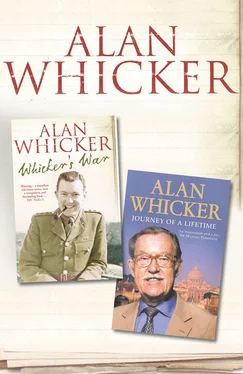He had ordered every unit to dig-in and consolidate – when they could have driven unopposed into the surrounding hills and cut Kesselring’s communications to the south. General Mark Clark cancelled the use of the US 504th Parachute Regiment along with the jump by an airborne division on to Rome Airport. The whole operation became stagnant, with commando raids discouraged and all effort concentrated upon defence. Fifty thousand troops were not enough for an attack, it seemed; we had to dig-in and await reinforcements. The Germans, meanwhile, had eighteen divisions south of Rome and were anxious to use them.
Lucas did not think of Rome, he thought of Gallipoli, Tobruk and Dunkirk, of desperate defeat. In the first 48 hours our initial Anzio victory was thrown-away. This is where we needed the fire-eating fast-moving General Patton.
During the planning for Shingle , General Lucas had confessed to his diary his nervousness about the Anzio operation, ‘This whole affair has a strong odour of Gallipoli, and apparently the same amateur (Churchill) is still on the coach’s bench.’ When he risked voicing that opinion to the Allied Naval Commander-in-Chief Mediterranean, Admiral Sir John Cunningham, he got a sharp sailor’s reaction: ‘If that’s how you feel you’d better resign.’ He did not.
Even Lucas’s Commander, General Mark Clark, had warned him ‘not to stick his neck out’ the way he had (he said) at Salerno. He was telling Lucas to fight the battle as he saw fit, but it is incredible that such a cautious and unenterprising General should have been chosen to lead a daring operation demanding dash and drive. However, this advice may have been influenced by Clark’s determination to liberate Rome himself. He did not want some bemused subordinate arriving there first, after a lucky punch.
We had achieved surprise with our landing, so half the battle was won; but then the slow Allied exploitation and the intensity of the German reaction instantly recreated the equilibrium, and the attacking British and Americans fell back into the submissive posture of a besieged garrison.
The Germans were amazed we made no move; surely it was unthinkable that we should do nothing? With such cooperation they had little difficulty in containing us. Their reaction to our invasion became almost overwhelming: within days seven divisions had been rushed in to surround us, including Panzers with Tiger tanks.
British commanders were seething with frustration at their enforced inaction. Up in the front line I found Guardsmen brewing-up and their officers playing bridge, while awaiting orders. They should have been racing for Rome.
In Cairo, General Sir Henry Maitland Wilson (‘Jumbo’) who had just succeeded General Eisenhower as Allied Commander Mediterranean, made it clear to the Press – and to Kesselring – that he was going to defend, not attack. ‘If the Germans run true to style, as they always do’ he announced 48 hours after our landing, ‘they will counter-attack our beachhead.’ Thus he advertised our passive intentions to the enemy.
So all was not going well at Anzio. We had launched a major landing led by only two divisions, plus Commandos and US Rangers. At Salerno, with no surprise and no numerical dominance, we only just escaped being flung back into the sea, defeated. Clutching desperately at a landing beach an attacker initially needs total dominance, as General Montgomery well knew.
When Churchill first showed him the plan for Overlord , the Second Front in Normandy which he was to command when he left Italy, Montgomery’s immediate reaction was, ‘This will not do. I must have more in the initial punch.’ D-Day in Normandy was to be in four months’ time, and Churchill admitted, ‘After considerable argument a whole set of arrangements was made in consequence of his opinion, which proved right.’
Montgomery’s knowledge of the price we paid in Italy saved thousands of lives in Normandy. To escape such a stalemate the invasion planners could now demand greater strength for Overlord. They had learned the expensive lessons of Anzio.
From D + 1 even I could tell that if we were fortunate enough to hold on to our beachhead, we faced a long and desperate battle – so I requisitioned a large house overlooking the harbour. It was a substantial three-storey lump of a place and – I noted approvingly – strongly built. It stood high over the seashore in front of the coast road. The front line was only seven miles away. At a push we could drive – or swim – out of trouble.
From its wide terrace we would get excellent pictures of our shipping being shelled and bombed – and doubtless, sunk. It was an ideal place for a billet and tripod position – but on the other hand it was at the heart of the German artillery’s target area … I’d worry about that tomorrow.
From their observation posts in the Alban Hills enemy gunners could watch every inch of the beachhead, and look deep into our private lives. No man could move without being seen. Little wonder Corncob Charlie rarely left his HQ down in the caves of Nettuno.
In our barren seaside villa we too slept in the cellars until deciding that shells were preferable to rats, and moving back to the ground floor. Our rats were all fat and overconfident – and at a battlefront you knew exactly what they had been eating. Even upstairs I awoke one night to find an enormous rat staring at me across my feet. It was wondering what to do. I knew what to do. I reached for my bedside .38 and – hoping to miss my big toes – shot it.
That awoke the remainder of the unit who thought the Germans had landed. They were about to shoot-back through my door, just to be on the safe side …
Calm restored, Geoffrey Keating and I considered the drill, should the Germans ever come to call. We’d seen some tattered clothes in the garden shed and decided to wear these and head north for Rome, rather than attempt to get back to the Eighth Army through the German lines.
Major Keating, my CO, was a most unusual man. A devout Catholic and bon viveur, he had an extremely high threshold of pain, which could be disconcerting. He just did not seem to notice when violence or death was approaching. He had arrived in Egypt to run Montgomery’s Army Film Unit and, indifferent to General Rommel and the Afrika Korps, began cheerfully swanning around the desert as though gate-crashing other Units’ parties, blithely unconcerned about any battles going on around him. This of course meant he was never injured and survived to win an excellent Military Cross.
He never touched drink – though it might have sustained such a perilous lifestyle. One afternoon after the war Susie, a mutual friend, rang me at BBC Television Centre to say they had just got married … This was another surprise. I had a table at Prunier’s that evening so invited them along, if they had no plans.
Looking through the wine list for something interesting with which to toast his bride, Geoffrey settled for a cider, assuming it to be the softest of drinks and better with fish than a coke. After several country ciders he moved unsteadily towards the marriage bed, and from then on his life and social consumption changed direction. He never looked back – and his wife never forgave me.
At Anzio I went with him around our front-line positions and suddenly noticed that, while we were driving in his open jeep along an embankment, laughing and chatting, we were on the dreaded Lateral Road where nothing else moved. I remembered tanks rarely ventured along it in daylight because of heavy enemy artillery fire and German machine guns with sights locked-on to any movement.
We were looking for a Company HQ. There was no other traffic. Then I saw a few soldiers in the dugout positions below us. They were moving at a crouch or lying looking up at us as we drove happily along, an apparition in a no-go area. Just before the firing began, I realised we were not travelling sensibly.
Читать дальше












